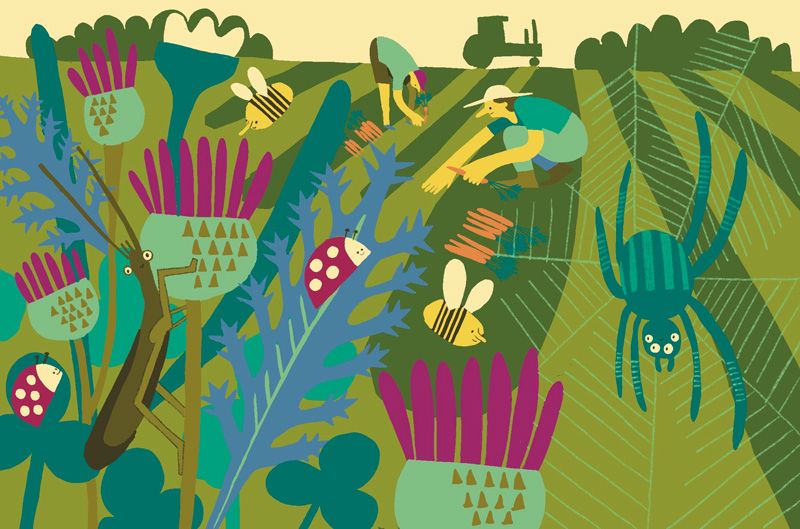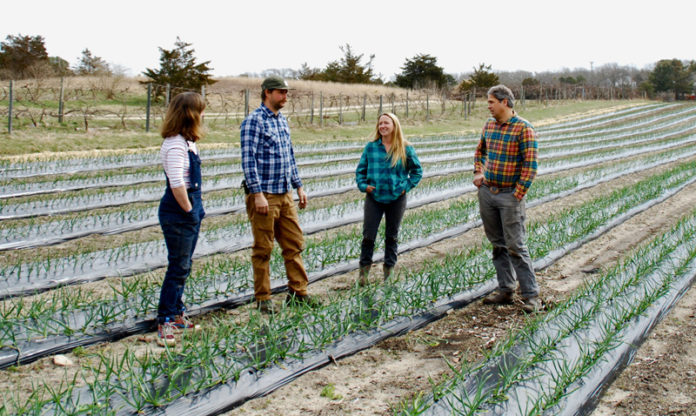The Athearns have never been big into shortcuts.
Owners of Morning Glory Farm, the family has managed about 130 acres of farmland on Martha’s Vineyard since 1975 — and they’ve always put the plant first. Customers carrying bags out of the Edgartown farmstand can feel confident in the quality of what they’re bringing home to feed their families. The farm has long been a trusted source for locally, sustainably grown food.
So the decision to pursue organic certification was a natural one, said Simon Athearn, who took over ownership with his wife Robyn, brother Daniel, and sister-in-law Meg, about two years ago. Morning Glory has been prioritizing organic systems since the day it was founded, but now it’s a matter of making it official.
“We always have maintained the land with a primary focus on soil health,” Simon said. “We’ve been composting and carbon-cropping in micronutrients since before it was a hit … My parents started things out this way, but we haven’t been formal.”
Morning Glory Farm is in the process of transitioning most of its fields into certified organic land. The process takes about three years, and is more or less a formality for farmers like the Athearns, who have always placed more emphasis on organic systems through soil quality, nutrient cycling, and plant health, and less emphasis on conventional practices that depend on synthetic chemical inputs.
“It’s really a push over the finish line,” Simon said of the certification process, which the farm officially began in January 2021. By spring 2024, customers can expect to see the coveted USDA organic label on most products. Morning Glory will be the third Island farm to achieve federal certification, joining Grey Barn and Stannard farms in Chilmark and West Tisbury.

So why now? And what does it mean to be certified organic?
Since the early ’90s, there’s been a bit of a “gag order” around using the term. The Organic Food Production Act was implemented in 1990 in response to varying and confusing standards for labeling foods and products organic. OFPA aimed to level the playing field for organic producers, assure customers that organic products met a consistent standard, and require third-party certification to ensure compliance. The national standard created a rigid system around being able to call foods and products organic, and farms like Morning Glory had to stop using the word unless they went through the dogmatic certification process.
For years, it didn’t seem worth it to the Athearns. The paperwork, time, and labor that went into getting certified organic deterred them from doing so. Beyond that, Morning Glory had already established a trusted relationship with its clientele: The federal seal is often of greater urgency when the customer has “no chance” of talking to the farmer.
“That wasn’t us,” Simon said. “Then, after several years of fielding questions regularly about our methodology, we realized we basically have all the records and practices in place. Since we’re not allowed to use the word ‘organic,’ it puts us at a disadvantage to keep not using it even though we’re doing all the effort for it … Our family said, Let’s just go ahead and do it. Let’s make sure everything is formal and get it certified.”
Customer interest also played a pivotal role in the decision. Consumers are increasingly prioritizing, and willing to pay a little extra, for products labeled organic.
“For a long time, the prices wouldn’t allow you to do it, because the customer wasn’t ready to pay,” Simon said. “I’m overjoyed to think the customer really is telling us, ‘Yes, please spend the extra money on organic products, and I will make you whole for it.’”
Since Morning Glory has already adapted organic practices, they’ll just have to pay an annual USDA filing fee of $2,500 — the amount varies farm to farm, depending on size. Simon said he’s not frightened of costs, and wouldn’t encourage others to be, and that longstanding subsidies can offset many fees.
The Athearns partnered with certifiers Bay State Organics, and are about a year into the process. Once they’ve fully transitioned their target fields, certifying agents will inspect the land and grant certification. The farm will be inspected at least once a year to maintain certification.
So far, since most of the organic practices are already in place; it’s been a labor of “little refinements,” Simon said.
Robust recordkeeping is among the biggest to-dos. In addition to documentation, the farm has had to switch certain suppliers (ie. onion, peat moss, mulch film) to be in compliance with federal organic standards. In the greenhouse, Morning Glory has had to replace its pressure-treated boards with a rigid plastic material, and rethink transplants.

“Little adjustments like that,” Simon said, adding that while it’s he, his brother, and their spouses leading the effort, the entire team at Morning Glory Farm is fully onboard. Greenhouse manager Martin Opio is spearheading recordkeeping in the greenhouse, distribution manager Casey Mazar-Kelly handles wholesale and wash barn documentation, and field crew chief Ryan Hassell manages day-to-day recordkeeping.
“It is a volume of paperwork, but that’s what good businesspeople and good farmers are already doing,” Simon said. “They’re keeping track of where you planted things, what seeds you used, what fertilizers you used — it’s already what you’re doing … My staff really enjoys being part of this organic transition. There’s a real enthusiasm. It makes us all feel good to be in service of a worthy goal.”
As mentioned before, Morning Glory is not certifying all 130 acres that they farm. They can’t quite figure out how to get their sweet corn fully organic, so they’re not certifying that field.
“We’re OK with that,” Simon said. “Me and a lot of the farmers we’ve worked with have not figured out a way to grow sweet corn organically and well enough for the demand of our customers. For us, it’s worth using a herbicide to combat trading off hydraulic and diesel labor or hand labor … these are the decisions farmers have to make, which simplistic conversations don’t get into.”
The intention, Simon said, is to “get the ball rolling,” certifying as much as they can, and adding acreage as they innovate and advance.
As far as encouraging other farms to seek organic certification, Simon said it’s the practices that matter — not necessarily the dogma.
“I would encourage farms to take on all the systems of it and to think more biologically in their behavior, but the need for certification is not that potent to me if you’re a farmer serving the customer directly,” Simon said. “We produce a lot of food, and I think that pushes us to an edge that we don’t get to communicate with every customer. It’s more important to us to make sure there’s a clear indicator of our growing practices. I think to be certified is a statement to the world.”


